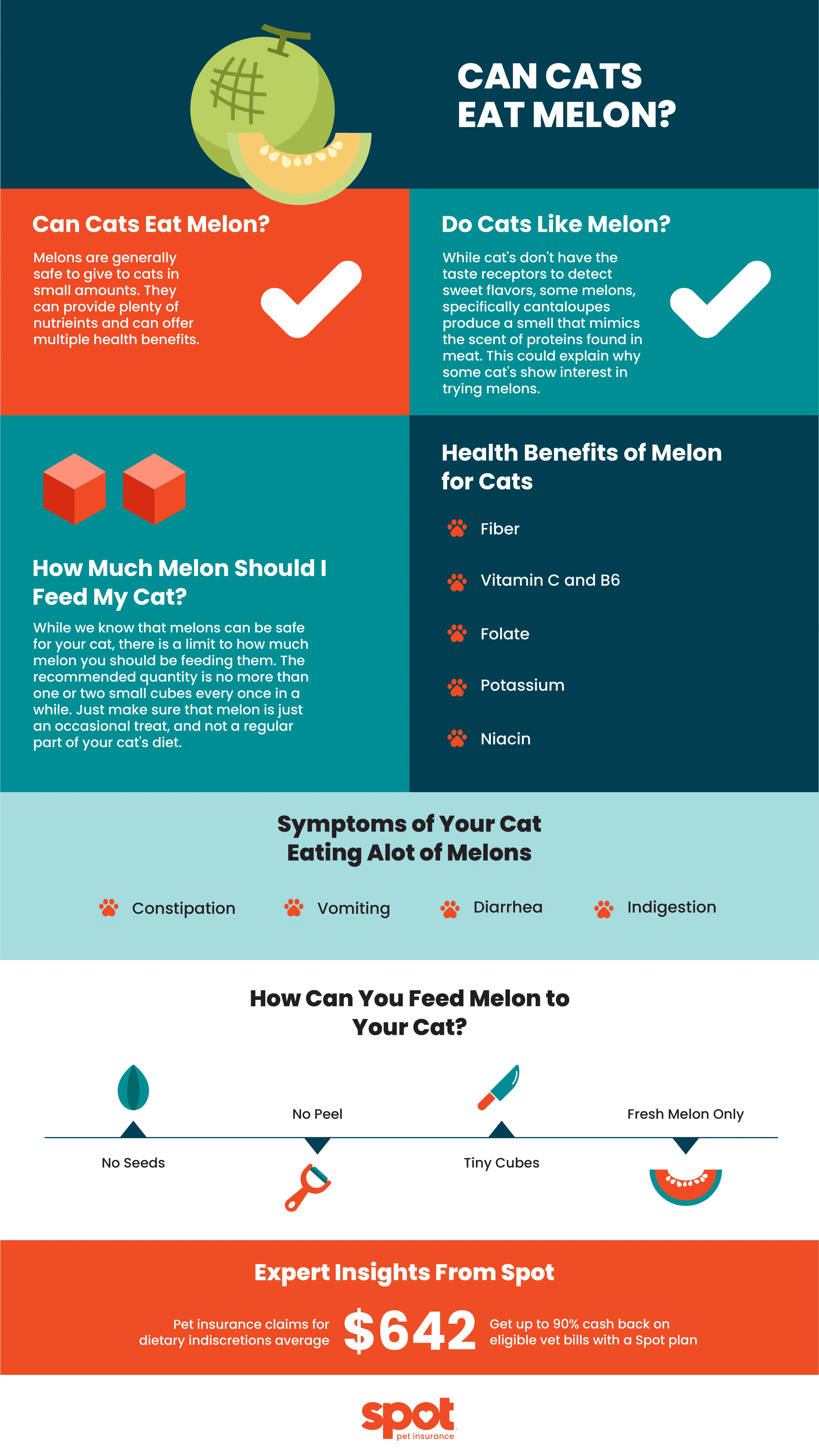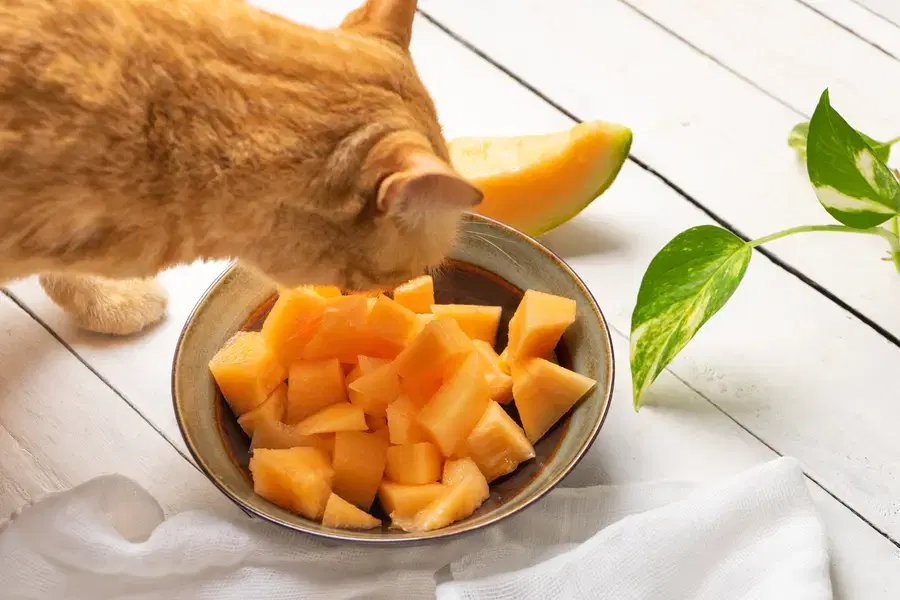Musk melon, watermelon, cantaloupe, honeydew, winter melon, casaba melon, bitter melon, American cucumber, mouse melon, sugar baby Matisse, and many more, are all members of the melon family. For this article, we’ll stick to the 3 main types of melons that we commonly eat; Musk Melon, Watermelon, and Cantaloupe.
A melon is any of various plants of the family Cucurbitaceae and has sweet, edible, and fleshy fruit. The word "melon" can refer to either the plant or specifically to the fruit. The melon plant is believed to have originated in Central Asia,1 but they have a fan following all over the world. Having said that, do our feline friends get excited about melons as much as we humans do?

Can Cats Eat Melon?
Yes, these melons are typically safe to give your cat to eat. They are not just safe but can also provide many benefits to them as well.2
Do Cats Like Melon?
While cats lack the sweet taste buds that we humans have, cantaloupes produce a smell that mimics the scent of protein in meat. This happens because of the amino acids present in them.3 Having said that, it is also possible that your cat is attracted to melons because of their curious nature. So, your cat may want to try some of the melon you’re eating.
Is Melon Good for Cats?
The answer is, yes. Cats are carnivorous in nature, meaning the majority of their nutrition requirements should come from meat. But, fruits like melon can provide some good benefits to their health. Let’s break down the nutritional content of melons.
A serving of 100 grams of cantaloupe consists of the following4 –
Calories: 34
Fat – 0.2g
Cholesterol: 0mg
Sodium – 16mgs
Fiber: 0.9g
Sugars: 8g
Protein: 0.8g
Potassium: 267mg
Iron: 1% DV
Health Benefits of Melon for Cats
Cats can extract dietary fiber, folate, vitamins B6, A, and C, niacin, and potassium in good quantities from melons. All of these can provide multiple benefits to the cat, including -5
Fiber - Helps with digestive functions and benefits the stool quality of cats. It also helps in cases of constipation, diarrhea, diabetes, and even obesity.
Vitamin C – Melons can help provide the vitamin C cats need to maintain healthy skin and vision.
Vitamin B6 – It helps in maintaining a healthy immune function and red blood cell function.
Folate – It helps in reducing or preventing congenital heart defects and neural tube problems in kittens born to mothers with folic acid deficiency.
Potassium - Is required for the normal function of muscles and bodily systems.
Niacin – It helps cats to metabolize fats properly, which can improve skin health as well as brain function.
Not to forget all the water that these fruits have can help keep your cat hydrated.
How Much Melon Should I Feed My Cat?
While we know that melons can be safe for your cat, there is a limit to how much melon you should be feeding them. The recommended quantity is no more than one or two small cubes once in a while. You need to make sure that melon is just an occasional ‘good behavior’ treat and not a part of their daily diet. Your cat could face side effects of eating too much melon.
How Can You Feed Melon to Your Cat?
Melons are big fruits with a lot of seeds in them. It is important that they are fed in the right manner to help avoid complications.
No seeds – The seeds should be removed to help reduce the risk of your cat choking on them.
No peel – The peel can be quite toxic to your cat. Also, the pesticides and dirt on the peel can cause problems for your cat’s digestive system.
Tiny cubes – Do not give your cat an entire melon. Make sure to only provide small, bite-sized pieces as an occasional snack.
Fresh Melon only – Do not feed your cat any type of melon syrup, dried melon, or a melon-based artificial drink. They could contain a lot of sugar and can harm your cat.
My Cat Ate Too Much Melon. What Do I Do?
As said earlier, the smell of cantaloupes could attract your cat, and they may end up accidentally eating more than they should have. If this happens, keep an eye out for the following symptoms:
Diarrhea
Indigestion
Constipation
These symptoms are usually caused because of the high fiber content in these fruits.5
Which Cats Should Not Eat Melon?
There are some cats, not specific to any breed, which may be more susceptible to stomach harm from eating melons. For them, melon should altogether be avoided. This list can include:
Cats with obesity problems – Cats that are at risk of being overweight or are already struggling with obesity should completely avoid melons because of their high sugar content.
Cats with diabetes – For the same reason, cats at risk of developing diabetes should avoid this fruit.
Expert Insights From Spot
While sharing our favorite foods with our pets can be tempting, it's important to remember that not all human foods are safe for our pets. Spot's internal data shows that pet insurance claims for dietary indiscretions average $642*, highlighting the importance of caution and research before sharing snacks with your pet.
How Spot Pet Insurance Can Help
Spot’s Accident-Only and Accident and Illness plans can help with the eligible costs of treatment if your cat is experiencing stomach issues after eating too much melon. Spot's cat insurance plans can help provide up to 90% cash back on eligible vet bills, so you can choose the best treatment for your pet with less worry about the cost. Get a free quote today!
Conclusion
Melons are considered safe for your cat to eat, but should only be given as an occasional treat in small, bite-sized pieces. These colorful, juicy, and mouth-watering family of fruits can become a very good and healthy occasional treat and also a good hydrating agent but not a replacement for your cat’s daily meal. So go on and enjoy your summer with tons of melon for your belly, but remember to keep it low and occasional for your feline buddy.
Happy mood and health to your purry friend and lots of love and licks to you! (Licks by your cat).

Mostly a tech person, always a pet person. I am dedicated to improving the lives of pets and their humans with technology. Off-duty, I enjoy writing about the misbehaving of computer programs and my two Aussiedoodles, Calvin and Hobbes.
*Jan 2019 to Aug 2024 Spot Pet Insurance Services, LLC claims data.
The Editors of Encyclopedia Britannica. “Melon,” Britannica, 09 Aug. 2024, www.britannica.com/plant/melon.
Petch, Danielle. "Can Cats Eat Melon?" Trusted Housesitters, 05 Dec. 2023, https://www.trustedhousesitters.com/blog/pets/can-cats-eat-melon/.
Manucy, Teresa. “Which Fruits Can Cats Eat?” PetMD, www.petmd.com/cat/which-fruits-can-cats-eat.
“100 G Cantaloupe,” Nutritionix, 2024, www.nutritionix.com/food/cantaloupe/100-g. Accessed 20 Aug. 2024.
"Can Cats Eat Cantaloupe?" Adventure Den, 13 Sep. 2025, https://www.adventureden.ca/can-cats-eat-cantaloupe-safety-and-benefits-explained/.
The information presented in this article is for educational and informational purposes only and does not constitute or substitute for the advice of your veterinarian.












